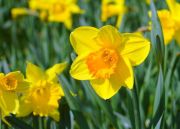Spring flowers appear a month early
According to the New Scientist, UK spring flowers are opening nearly a month earlier than they did before the mid-1980s, due to climate change.
That is the conclusion of a study of nearly 420,000 observations of the first flowering date of 406 plants from a UK citizen science project called Nature’s Calendar. It has records dating back to 1753 from gardeners and naturalists, as well as bodies such as the UK’s Royal Meteorological Society.
“It’s probably the longest [such] record in the world, certainly the largest,” says Ulf Büntgen at the University of Cambridge. He and his team found that plants were opening their flowers 26 days earlier on average in the years after 1986 than they did before.
The analysis included records of all plants, whatever time of year they flower, but most of them bloomed in spring. “It is likely that the influence of climate change will be greater for spring-flowering plants, where the usual onset of warmer temperatures that would trigger flowering starts earlier,” says a spokesperson for the UK’s Royal Horticultural Society. Read more
Confused plants
In December the RHS reported that unpredictable seasons had caused ‘confused’ plants to flower at the wrong time, creating short-lived spectacle as winter closes in.
It experienced exceptional displays at RHS gardens across the UK, as plants that generally flower in distinct seasons are currently in bloom at the same time. However, this crescendo of colour is likely to last just a couple of weeks.
RHS Chief Horticulturist Guy Barter explains, “After a good growing season like the one we experienced this summer, plants are flush with resources and as a result sometimes chance an extra flower or two later in the year. Similarly, without a prolonged cold period leaves are able to cling on for longer. However, they will only do this if the weather stays mild, so the notable lack of autumn frost has been critical to this year’s unusual display.”

